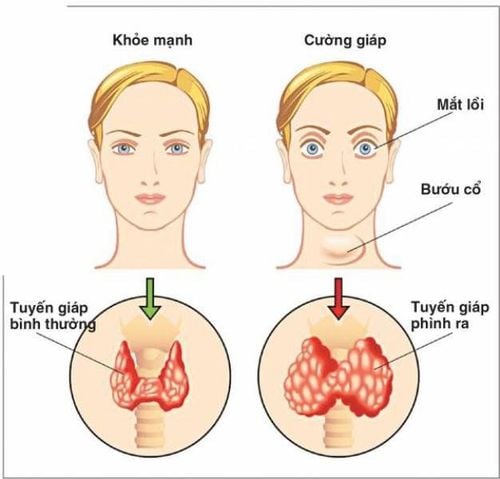This is an automatically translated article.
Kaltatri 0.25 is made in the form of softgels with the main ingredient Alfacalcidol. The drug is used in the treatment of certain bone and thyroid diseases.
1. What diseases does Kaltatri treat?
1 Kaltatri 0.25 tablet contains Alfacalcidol 0.25μg and excipients just enough. Alfacalcidol is fat soluble and is usually absorbed up to 100%. After absorption, Alfacalcidol is rapidly hydroxylated, mainly in the liver, although this enzyme is widely distributed in body tissues. Alfacalcidol is rapidly metabolized in the liver to 1,25-dihydroxy vitamin D3, which acts as a regulator of calcium and phosphate metabolism. Thanks to this rapid conversion, the therapeutic effects of Alfacalcidol are similar to 1,25-dihydroxy vitamin D3. The main effect is to increase the circulating concentration of 1,25-dihydroxy vitamin D3, thereby increasing the intestinal absorption of calcium and phosphate, promoting bone mineralization, regulating the concentration of parathyroid hormone in the blood plasma. , while reducing bone resorption, reducing pain in bones and muscles.
Indications: Use Kaltatri in the following cases:
Treatment of renal osteodystrophy; Treatment of hyperparathyroidism (with bone disease); Treatment of hypoparathyroidism; Treatment of osteomalacia and rickets caused by poor nutrition and absorption; Treatment of osteomalacia and rickets depends on vitamin D; Treatment of osteomalacia and hypophosphataemic vitamin D-resistant rickets; Treatment of osteoporosis; Contraindications: Do not use Kaltatri 0.25 for the following cases:
People with hypersensitivity to Alfacalcidol or any of the ingredients in the drug; People with hypercalcemia, hyperphosphatemia, hypermagnesemia or metastatic calcification.
2. Usage and dosage of Kaltatri 0.25
How to use:
Kaltatri is prepared in the form of tablets, so patients use it orally; Take the drug with a full glass of cold water, take the pill whole, do not break it before use, do not chew the tablet; Kaltatri should be taken after meals; Dosage:
Starting dose (except for osteoporosis): For adults: 1 μg/day; For children weighing 20kg or more: Except for patients with renal osteoporosis: 1 μg/day; Renal osteodystrophy: 0.04 - 0.08 μg/kg/day; Children weighing less than 20kg: 0.05 μg/kg/day; People with osteoporosis: 0.5 - 1 μg/day with or without calcium; Dosage is then adjusted according to the biochemical response to avoid the occurrence of hypercalcemia. Dosage of Alfacalcidol can be increased by about 0.25 - 0.5 μg/day; Most adults respond to doses of 1-2 μg/day.
Overdose:
Symptoms: Overdosage of Kaltatri occurs manifestations of hypercalcemia such as: Fatigue, nausea, vomiting, dizziness, dry mouth, bone pain, muscle pain, arthralgia, itching or palpitations ; Treatment: Alfacalcidol therapy should be discontinued when hypercalcaemia occurs. Hypercalcemia in severe cases may require supportive measures such as cardiovascular fluids and, if necessary, additional loop diuretics or corticosteroids; In case of acute poisoning, it is recommended to treat with gastric lavage method, use mineral oil to reduce drug absorption and increase drug elimination through feces.
3. Side effects when using Kaltatri 0.25
In general, side effects when using Kaltatri 0.25 are related to hypercalcemia and in the case of patients with renal failure, hyperphosphatemia may also occur.
Some other undesirable effects are: Itching, urticaria, rash, abdominal pain, stomach pain, constipation, diarrhea, loss of appetite, conjunctival congestion.
Patients need to inform the specialist doctor about the unwanted effects encountered during the use of Kaltatri to have the most appropriate treatment measures.
4. Be careful when using Kaltatri 0.25
Some cautions when taking Kaltatri that patients need to remember:
Alfacalcidol increases the absorption of calcium and phosphate in the intestine, patients need to monitor serum levels, especially in those with renal failure; It is necessary to monitor the concentration of calcium, phosphate, alkaline phosphate, creatine, magnesium regularly as well as other necessary biochemical parameters; If hypercalcemia or hypercalciuria occurs, it can be corrected by stopping treatment until plasma calcium levels return to normal. Thereafter, Alfacalcidol may be restarted with 1⁄2 doses of the last dose administered or according to the patient's response; Alfacalcidol should be used with caution in patients with hypercalciuria, especially in patients with a history of kidney stones; Considerations when using Kaltatri for elderly subjects; Pregnancy: There are no adequate data on the use of Alfacalcidol in pregnant women. Kaltatri 0.25 should be used with caution in pregnant women because hypercalcemia during pregnancy can cause congenital disorders in the baby; Lactation: Although not yet established, levels of 1,25-dihydroxy vitamin D may be increased in breast milk of lactating mothers receiving Alfacalcidol. This can affect the child's calcium metabolism; The effect of Alfacalcidol on the ability to drive and use machines has not been reported.
5. Kaltatri drug interactions 0.25
Some drug interactions Kaltatri 0.25 are:
Hypercalcemia in patients taking cardiac glycosides can cause arrhythmias. Therefore, patients taking concomitant cardiac glycosides and Alfacalcidol should be closely monitored; When co-administering barbiturates or enzyme-inducing anticonvulsants, it is necessary to increase the dose of Alfacalcidol to achieve the required effect; Co-administration of Alfacalcidol with mineral oil (long-term use), colestipol, cholestyramine, sucralfate or large amounts of aluminum in antacids may reduce the absorption of Alfacalcidol; The risk of hypercalcemia is increased in patients taking calcium-containing preparations or thiazide diuretics with Alfacalcidol; Caution should be exercised when using magnesium-containing antacids or laxatives in patients on prolonged hemodialysis who are taking Alfacalcidol. Hypermagnesemia may occur; Alfacalcidol should not be used concomitantly with vitamin D or vitamin D derivatives due to the potential for increased effects and increased risk of hypercalcemia; The patient should fully list all the treatment drugs, herbs, vitamins, support pills and dietary supplements that he or she is taking recently so that the doctor can know and give accurate advice, avoiding conflicts. adverse drug effects occur.
During the use of Kaltatri, patients should pay attention to follow the instructions of the doctor, do not arbitrarily adjust the dose to achieve the desired effect.
Please dial HOTLINE for more information or register for an appointment HERE. Download MyVinmec app to make appointments faster and to manage your bookings easily.













